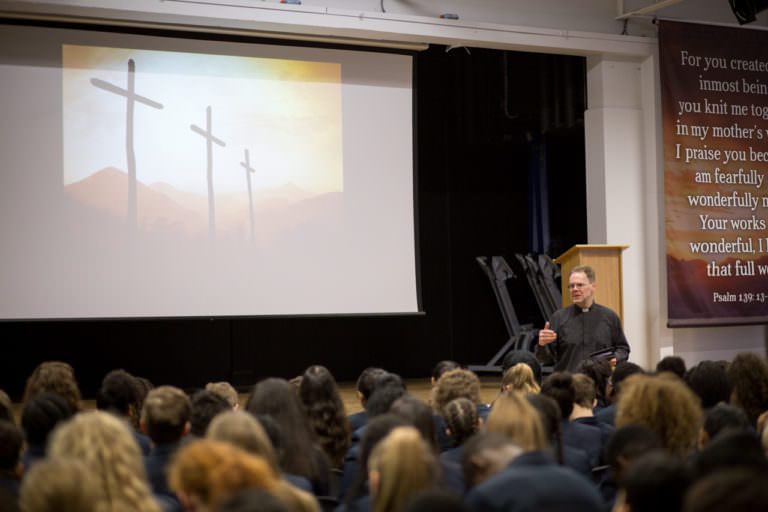Our Religious Studies curriculum intends to enable pupils to explore their own beliefs, the beliefs of others and ultimately their belief in God. This underpins our desire to encourage morally upright citizens within our community where understanding, empathy, respect and love are paramount. We also encourage the building of faith in themselves through confidence, independence, resilience, and hope to achieve their full potential in pursuing their purpose in life. Central to our knowledge-rich curriculum is the understanding of Christianity as a living and diverse faith in the twenty-first century, allowing students to explore, interpret and evaluate key beliefs and texts. This exploration enables the understanding of historical context as well as the impact these teachings can have in society today. In order to support pupil’s evaluation of key beliefs and texts, we ensure that we support the development of pupil religious literacy through reading a range of interpretations, deliberately practising how to constructively argue, how to provide evidence to substantiate claims, and evaluate how convincing these arguments are.
To ensure breadth of understanding, we provide a diverse range of religions and worldviews to be investigated, including the Abrahamic traditions, the Dharmic faiths and Humanism. These reflect the student beliefs of our school community as well as fostering a deeper understanding and respect for diversity of opinion across cultures. The building of cultural capital is intertwined throughout all our topics to promote the relevance of Religious Studies in everyday life, from understanding of career paths, development of decision-making and debating skills to reflecting on the individual impact we can have on our local community and the wider world.
Edexcel GCSE in Religious Studies B (1RB0)
The qualification consists of three Areas of Study from which students study two, which are then assessed through two externally set examination papers. Students must complete all assessment in May/June in any single year
Paper 1: Area of Study 1 – Religion and Ethics (*Paper code: 1RB0/1A – 1G)
- Written examination: 1 hour and 45 minutes
- 50% of the qualification
- 102 marks
Content overview:
Students must study all four content sections based upon their chosen religion (Christianity).
- Beliefs
- Marriage and the Family
- Living the Religious Life
- Matters of Life and Death
Assessment overview:
- Students must answer all questions.
- The assessment consists of four questions.
- The paper may include short open, open response and extended writing questions.
- The paper will assess spelling, punctuation and grammar (SPaG) and use of specialist terminology and these will contribute a minimum of 5% of marks towards the overall weighting for this paper.
Paper 2: Area of Study 2 – Religion, Peace and Conflict (*Paper code: 1RB0/2A–2G)
- Written examination: 1 hour and 45 minutes
- 50% of the qualification
- 102 marks
Content overview:
Students must study all four content sections based upon their chosen religion (Islam).
- Beliefs
- Crime and Punishment
- Living the Religious Life
- Peace and Conflict
Assessment overview:
- Students must answer all questions.
- The assessment consists of four questions.
- The paper may include short open, open response and extended writing questions.
- The paper will assess spelling, punctuation and grammar (SPaG) and use of specialist terminology and these will contribute a minimum of 5% of marks towards the overall weighting for this paper.

Careers Links
Religious Studies is an excellent source of transferable skills that can be applied to a vast range of different career paths. Click here for examples of some of the employability skills Religious Studies can provide.
Explore career profiles related to this qualification on Unifrog:
- Montessori teacher
- Mediator
- Assistant director (TV or film)
- Funeral director
- Religious leader
- Advertising copywriter
- Student adviser
- Legal executive
- Local government officer
- Secondary school teacher
- Further education lecturer
- Newspaper or magazine editor
- MP
- Trade union official
- CEO (Chief executive officer)
- Charity fundraiser
- Solicitor
- Community development worker
- Family support worker
- Higher education lecturer
- Barrister
- Marketing executive
- Sociologist
- Political scientist
- Market researcher
- Charity director
- Recruitment consultant
- Human resources manager

